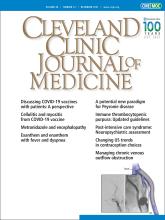To the Editor: Obesity, excessive body fat that impairs health, is defined by a body mass index (BMI) greater than 30 kg/m2.1 Although the prevalence of obesity has dramatically increased in the United States, treatment of obese Americans remains suboptimal. Stigma, costs, and physician lack of confidence in medical management of obesity may all contribute to this state of affairs.1
In a survey of 13,158 obese patients,2 only 40.4% received weight-loss counseling. In another study of 45 physicians,3 most reported calculating patient BMI, but only 13.5% consistently discussed the results with their patients.3 Weight bias, including concerns about insulting patients, may contribute to physicians’ reluctance to discuss obesity as a legitimate health concern.1
Further, providers who broach the subject often recommend lifestyle interventions. One survey showed that physicians were more comfortable counseling about lifestyle modification and least comfortable discussing pharmacotherapy.3 Physical activities, while essential, may not be sufficient to maintain weight loss over time. This is due to compensatory physiology that promotes weight maintenance.
In theory, patients with a BMI greater than 30 kg/m2 or a BMI greater than 27 kg/m2 with obesity-related complications who do not respond to a healthy low-calorie regimen and physical activity are eligible for medications. In practice, only 2% of appropriate patients receive pharmacotherapy.4
In a review by Mauer et al,5 the authors conclude that pharmacotherapy aids in weight loss and prevents regain. However, analysis of a survey of 94 primary care physicians found 76% did not recommend pharmacotherapy for long-term weight loss, and 58% had negative views towards pharmacotherapy.4 These data suggest that the prevailing philosophy is to avoid medications at all costs except in severe cases.4 Delaying pharmacotherapy until patients are severely obese may be too little, too late.
Recent guidelines suggest essential components of obesity care.1 Clinicians should ask the patient for permission to discuss obesity. Core tenets consist of individualized nutritional, physical, and psychological interventions along with surgery and medications.1 These guidelines also offer a new conceptualization of treatment that shifts the focus from BMI to improving overall health and well-being.
- Copyright © 2021 The Cleveland Clinic Foundation. All Rights Reserved.






